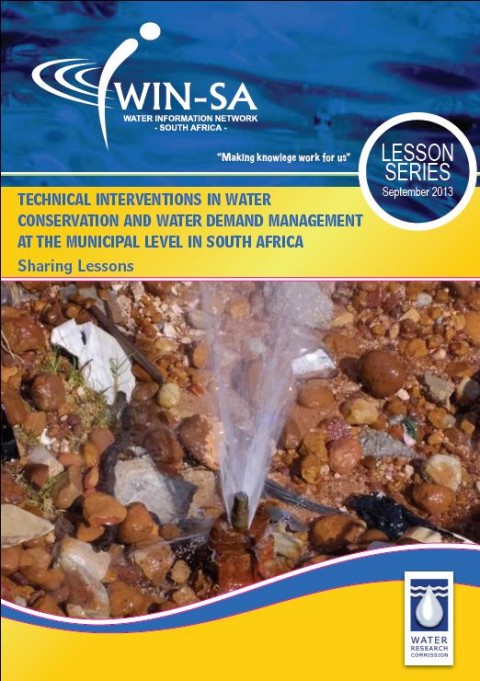Technical interventions in water conservation and water demand management at the municipal level in South Africa - Sharing lessons
WIN-SA (2013)

Published in: 2013
Publisher:
Water Information Network (WIN-SA), South Africa
Author:
WIN-SA
Uploaded by:
SuSanA secretariat
Partner profile:
common upload
5008 Views
76 Downloads
Content - Summary
Water is crucial to the advancement of any country. This is especially true for South Africa, which as a developing country, faces multiple challenges to water supply such as pending water stress, growing and urbanizing populations, socio-economic imbalances of the past, widespread poverty, geographically skewed availability and demand, changing weather patterns and persistent drought in many parts of the country.
As a result the infrastructure intensive supply systems needed at a national, regional and local level to deliver water to end-users are stressed and most municipalities across the country are unable to sustainably meet the demand of end-users. The dichotomy is that whilst municipalities are unable to meet demand, water losses are at an all-time high with non-revenue water estimates of around 35% of system input volume for the country as a whole. Much of this loss can be attributed to leakage and losses in both the network and on privately owned properties which, for the most part, is going unaccounted for and represents a revenue loss to the municipality.
The need for demand-side interventions that effectively reduce physical losses in water networks, artificial demand at the end-user level created through leakage, as well as apparent losses due to metering and billing deficiencies is abundantly clear.
In response to this need, municipalities across the country have initiated interventions, programmes and projects to reduce the demand for water with varying levels of success. Aimed at identifying, documenting and disseminating the experiences of municipalities in water demand management, the Water Research Commission directed the development of this Compendium of Case Studies relating to Water Demand Management at the municipal level in South Africa, presenting 40 case studies in an anecdotal easy-to-read format. The presented case studies highlight not only best practise in the industry, but also less effective approaches that can potentially achieve greater effectiveness through improved management and implementation.
Bibliographic information
WIN-SA (2013). Technical interventions in water conservation and water demand management at the municipal level in South Africa - Sharing lessons. Water Information Network (WIN-SA), South Africa
Filter tags
English Sub-Saharan Africa Urban (entire city)















